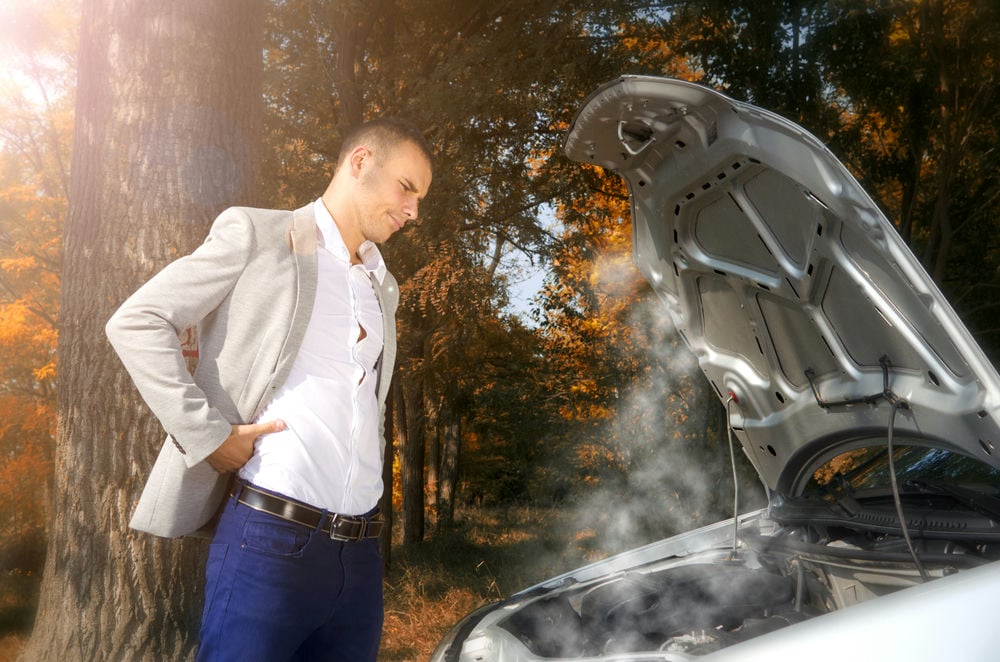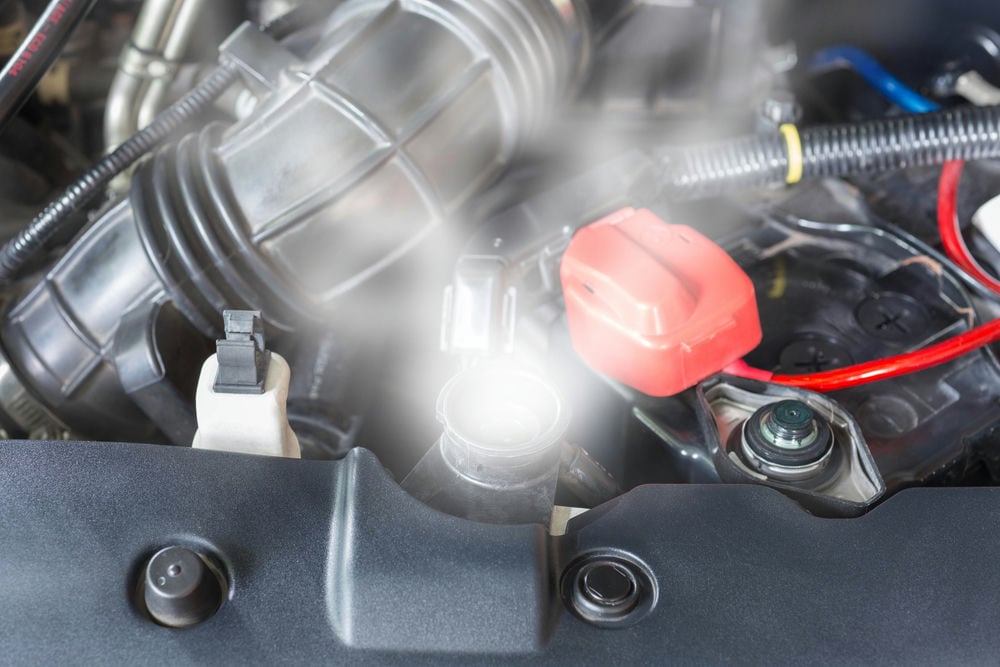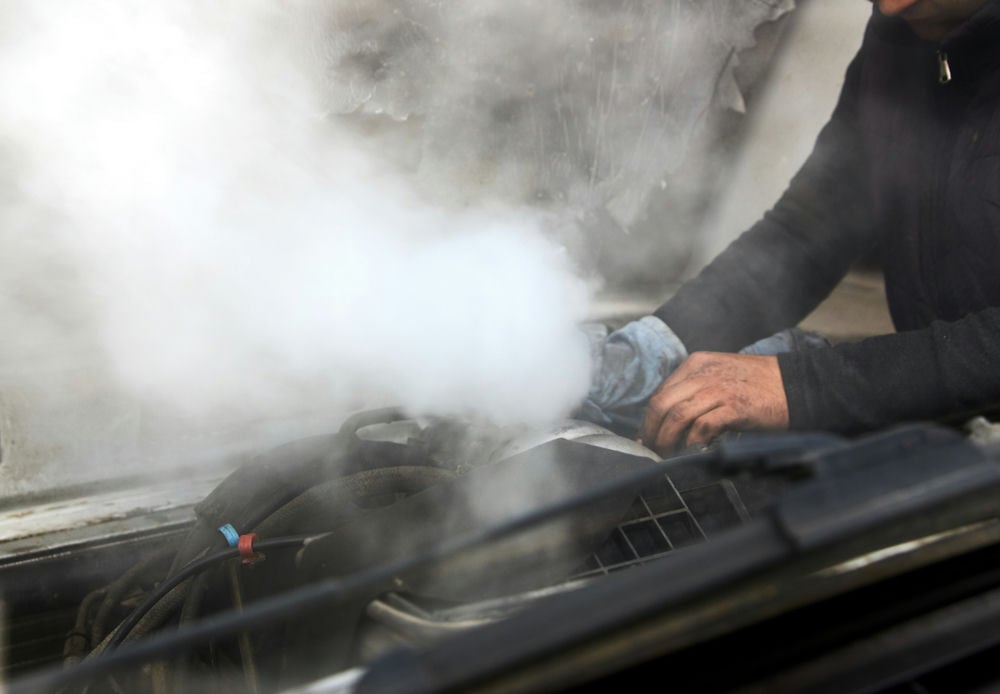Overloading: Running a car with a heavy load or towing a trailer can cause the engine to
overheat.
It's essential to have a mechanic diagnose and fix the problem as soon as
possible to prevent further damage to the engine.
 A man looking over his overheating engine on the side of the road.
A man looking over his overheating engine on the side of the road.
How Do I Know If My Car Is Low On Coolant?
You have a few ways to tell if your engine may be low on coolant,
including:
-
The temperature gauge on the dashboard shows that the engine is running
hot.
-
A warning light on the dashboard indicates overheating or insufficient
coolant.
-
Steam or a sweet smell coming from under the hood.
-
Bubbling or gurgling sounds are coming from the engine.
-
A puddle of coolant under the car
You can also check the coolant level by locating the coolant reservoir,
which is usually a clear plastic container in the engine compartment with a
"cold" and "hot" level line.
If the coolant level is low, you need to add more coolant to the engine as
soon as possible. If you notice a low coolant level, it's almost always an
indication of a leak in the system, and the leak should be found and
repaired as soon as possible.
It's important to use the correct type of coolant for your vehicle and not
mix different types. Consult your vehicle owner's manual or ask a mechanic
to ensure you use the proper coolant for your car.
 Steam escaping from the radiator.
Steam escaping from the radiator.
How Do You Fix An Engine Overheating While Idling?
There are several ways to fix an engine that is overheating while idling,
depending on the cause of the problem. Here are a few steps you can take:
1. Check the coolant level
If the coolant level is low, add more coolant to the engine. If the coolant
level keeps dropping, there may be a leak in the system, which should be
repaired as soon as possible.
2. Check the radiator fan
Ensure that the radiator fan is functioning correctly and can blow air
across the radiator to dissipate heat. If the fan isn't working, it may
need to be replaced.
3. Check the thermostat
A faulty thermostat can be tested by feeling the radiator hoses while the
engine is running. If the lower radiator hose doesn't quickly get hot when
the engine reaches running temperature, then the thermostat is probably
stuck and needs to be replaced.
4. Check the radiator
If the radiator is clogged, it can't circulate coolant through the engine
to keep it cool. The radiator should be cleaned or replaced if it is
clogged.
5. Check the water pump
A water pump is responsible for circulating the coolant throughout the
engine. If this component fails, it will not be able to properly circulate
coolant, causing the engine to overheat. The water pump should be replaced
if found to be faulty.
6. Check the hoses
Check the hoses for leaks, cracks, or loose connections. Make sure they are
still soft and pliable. Replace any hoses that are damaged or stiff.
7. Check the serpentine belt tensioner
If the belt tensioner isn't keeping the correct tension on the serpentine
belt, it can cause the belt to slip and, in turn, cause overheating.
If you are unsure of the cause or if the engine continues to overheat even
after trying these steps, you should have your car checked by a qualified
mechanic.
 A man investigating an overheating engine.
A man investigating an overheating engine.
How Much Does It Cost To Fix An Overheating Engine?
The cost to fix an overheated engine can vary greatly depending on the
problem and what's causing the issue.
A simple fix like topping off the coolant or replacing a radiator hose can
cost as little as $20 or $30. A thermostat is usually less than $50, but
you will pay more labor costs if you hire a mechanic.
More complicated solutions like replacing a radiator fan or water pump can
get more expensive, usually between $100 to $500 depending on your
particular car model.
A radiator flush is a reasonably cheap procedure to have done. However, if
you have to replace the radiator, you will have to spend several hundred
dollars for the new one, plus the labor cost to install it.
Conclusion
While there are a lot of different causes for your engine to overheat while
it's idling, it can usually be pretty easy to identify the problem.
Most of the problems that cause overheating can be easily fixed or
corrected without spending too much money.